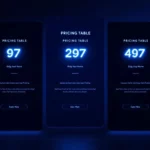Introduction
If PPC management is the engine of your marketing strategy, reporting and analytics are the dashboard.
Without them, you’re driving blind — spending money without knowing what’s working or why.
In 2025, PPC reporting and analytics aren’t just nice to have — they’re essential tools that separate the amateurs from the professionals.
Let’s dive into why analytics matter, what metrics to track, and how to use data to grow profitably.
1. The Foundation of All Optimization
Every great PPC campaign begins and ends with data.
Analytics show where clicks come from, how users behave, and what actions they take.
By tracking performance at every stage, marketers can identify what drives conversions and what drains budgets.
The best PPC firms use this insight to continuously optimize — ensuring no ad dollar is ever wasted.
2. Key Metrics Every Business Should Track
Not all data is useful. Focus on metrics that connect directly to ROI.
Here are the must-track PPC analytics:
- CTR (Click-Through Rate): How engaging your ads are.
- CPC (Cost Per Click): How efficiently you’re paying for traffic.
- Conversion Rate: How often clicks turn into leads or sales.
- Quality Score: Google’s rating of ad relevance.
- ROAS (Return on Ad Spend): The ultimate measure of success.
These metrics tell a clear story — one that helps shape better strategy and smarter decisions.
3. The Role of Conversion Tracking
You can’t measure success without tracking conversions.
Whether your goal is a phone call, form fill, or purchase, tools like Google Tag Manager and Google Analytics 4 provide real-time insights into what actions users take after clicking your ads.
Without this data, you might think your campaign isn’t working — when in reality, you’re just not measuring it properly.
4. Real-Time Reporting for Real Results
In 2025, reporting is no longer static.
Top PPC agencies use live dashboards that pull data directly from Google Ads, Meta, and CRM systems.
This allows business owners to:
- View performance at any time
- Compare ad platforms side by side
- Spot trends instantly
Transparent reporting builds trust — and trust builds long-term relationships.
5. Using Analytics to Optimize Budget Allocation
Data doesn’t just show results — it guides better decisions.
By analyzing campaign data weekly, agencies can identify high-performing audiences, devices, or time slots and shift budget toward what works.
This agile approach ensures maximum efficiency and profitability.
6. Predictive Analytics: The Future of PPC
The best PPC companies are already using AI-powered predictive analytics to anticipate performance trends.
These systems detect patterns in historical data and forecast future outcomes, allowing advertisers to scale faster and avoid underperforming campaigns before they waste budget.
It’s not just optimization anymore — it’s foresight.
7. Partnering with Data-Driven PPC Experts
At the end of the day, the difference between a good campaign and a great one comes down to data literacy.
A PPC partner who understands reporting, tracking, and analytics can help you make smarter, faster decisions.
👉 Want to see how expert reporting can boost your performance? Visit BestPPCFirm.com — the home of data-driven PPC management and analytics excellence.
FAQs
1. What is PPC reporting and analytics?
It’s the process of tracking and analyzing ad performance metrics to improve ROI and guide better campaign decisions.
2. Why is PPC analytics important?
It helps businesses identify what’s working, cut wasted spend, and optimize for continuous growth.
3. Which tools are best for PPC reporting?
Google Analytics 4, Data Studio, and SEMrush are top tools used by professional PPC agencies.







